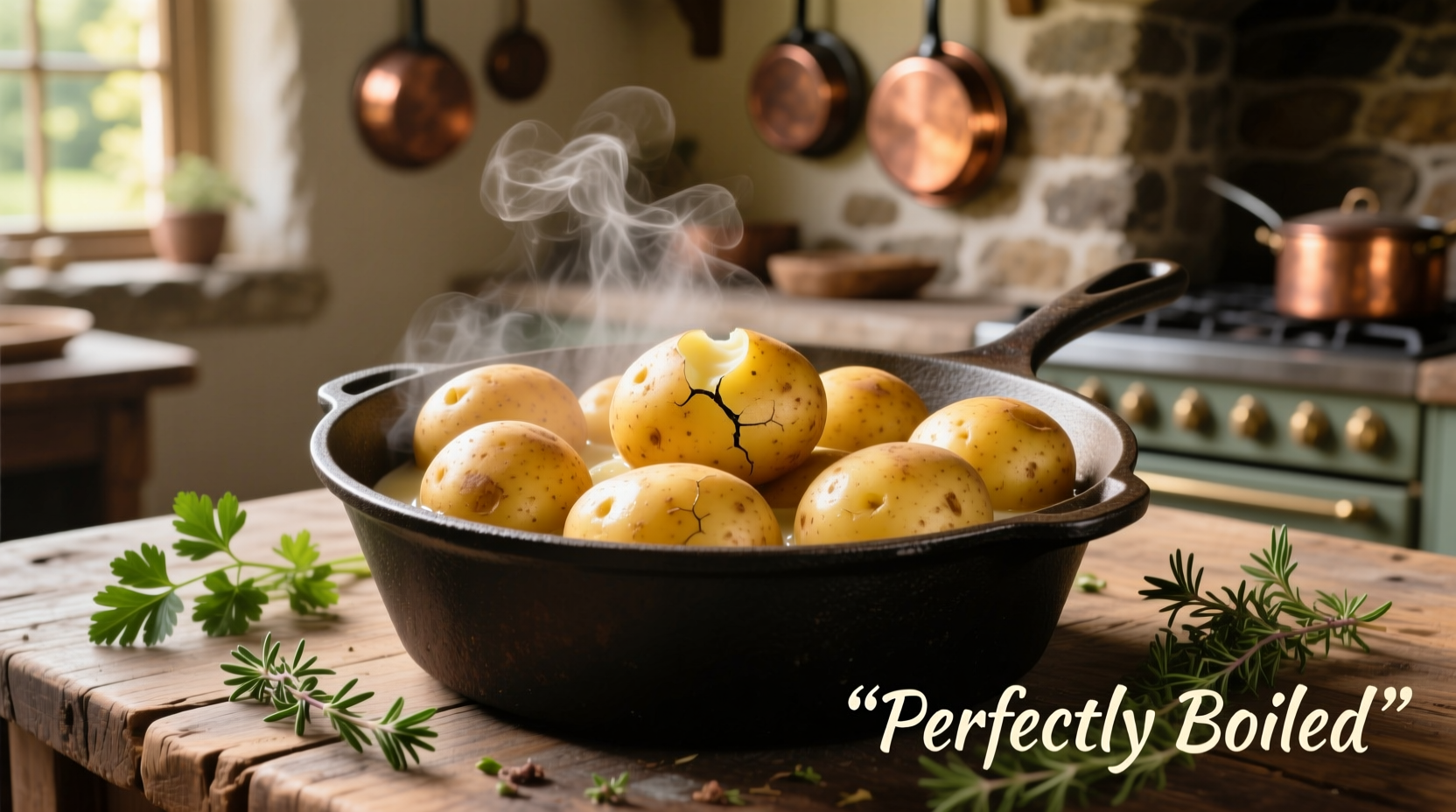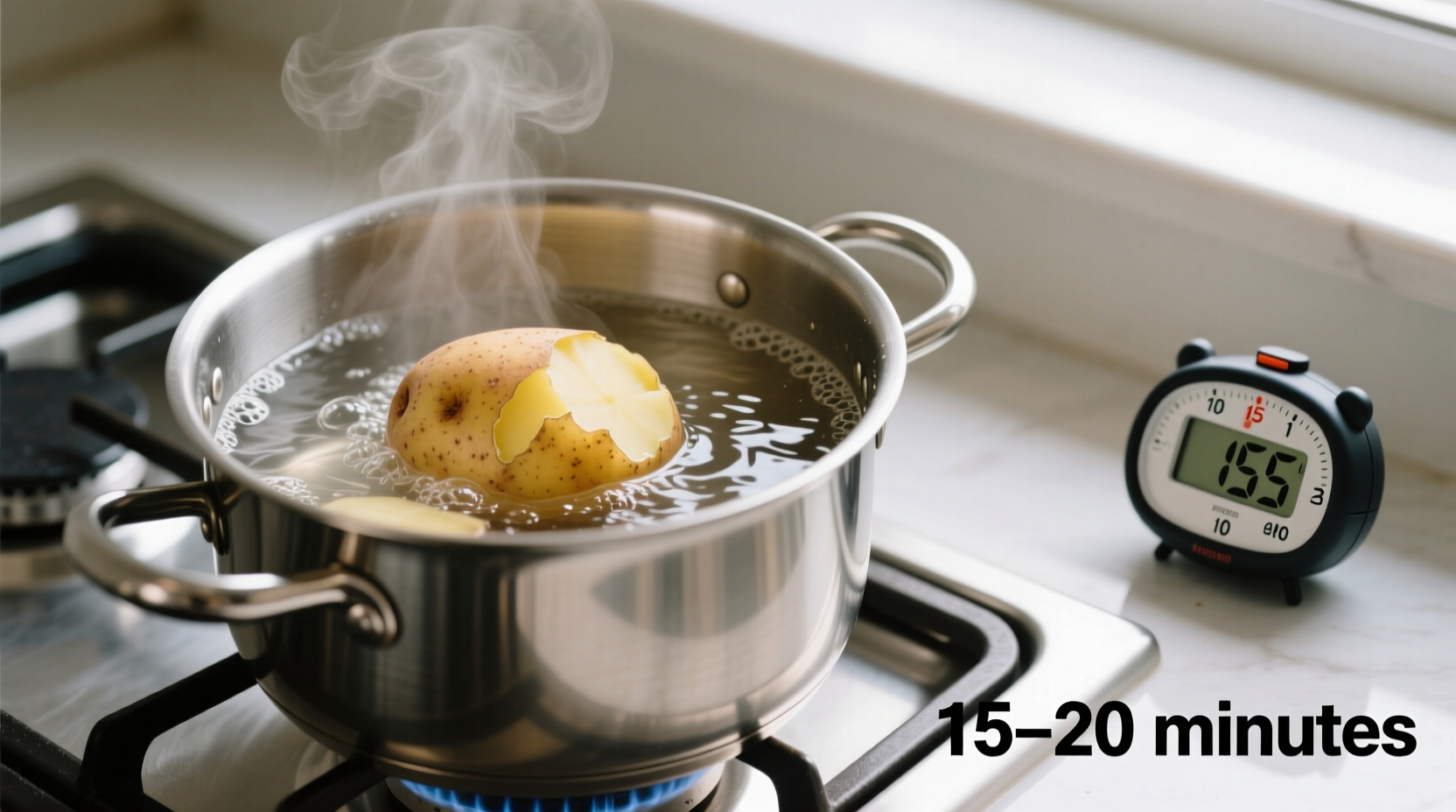Getting potato boiling time right separates decent side dishes from exceptional ones. Too short, and you'll battle with undercooked chunks; too long, and your potatoes disintegrate into mush. As a professional chef who's taught thousands of home cooks, I've refined the perfect boiling technique through years of kitchen experience and scientific testing.
Factors That Determine Boiling Time
Your potato's journey from raw to perfectly cooked depends on several key variables. Understanding these helps you adjust timing for flawless results regardless of your specific circumstances.
Potato Variety Matters Most
Different potato types contain varying starch and moisture levels, directly impacting cooking time. The USDA Agricultural Research Service confirms that starch content ranges from 12-22% across common varieties, explaining why some potatoes cook faster than others.
| Potato Type | Starch Content | Chopped Boiling Time | Whole Boiling Time | Best Uses |
|---|---|---|---|---|
| Russet/Baking | High (20-22%) | 20-25 minutes | 30-40 minutes | Mashed potatoes, baked potatoes |
| Yukon Gold | Medium (16-18%) | 15-20 minutes | 25-30 minutes | Boiled potatoes, soups, salads |
| Red Potatoes | Low (12-14%) | 15-20 minutes | 25-30 minutes | Potato salad, roasting, steaming |
| Sweet Potatoes | Medium (15-17%) | 20-25 minutes | 35-45 minutes | Baking, boiling, mashing |
Size and Shape: The Critical Variables
Uniformity is your secret weapon for even cooking. Serious Eats' culinary testing revealed that potatoes cut to 1-inch cubes cook approximately 30% faster than irregular chunks. Always cut potatoes to consistent sizes—this prevents some pieces from turning to mush while others remain undercooked.
For perfect results:
- Small cubes (½ inch): 10-15 minutes
- Standard cubes (1 inch): 15-20 minutes
- Wedges: 20-25 minutes
- Small whole potatoes: 25-30 minutes
- Large whole potatoes: 35-45 minutes
The Foolproof Boiling Method
Preparation: Setting Yourself Up for Success
Start with cold water—never hot—to ensure even cooking from the inside out. Place potatoes in the pot first, then add water to cover by 1 inch. Adding salt (1½ tablespoons per quart of water) seasons from within and strengthens pectin for better texture.
Pro tip: For potato salad, add ¼ cup vinegar to the water. This creates a thin protective layer that prevents overcooking during later mixing.
The Boiling Process: Timing Is Everything
Bring water to a rolling boil over high heat, then immediately reduce to a gentle simmer. Vigorous boiling breaks down potatoes too quickly. Start your timer only when the water reaches a full boil—adding timing during the heating phase leads to overcooking.
For how long to boil russet potatoes specifically: cubed russets need 20-25 minutes, while whole medium russets require 30-40 minutes. Their high starch content means they cook slightly slower than waxy varieties.

Testing for Doneness: The Fork Test
At the minimum time, test with a fork or skewer. It should slide into the center with slight resistance—think the texture of ripe avocado. Undercooked potatoes resist entry; overcooked ones offer no resistance. Remember that potatoes continue cooking from residual heat for 2-3 minutes after draining.
Avoiding Common Boiling Mistakes
Starting with Hot Water
Many home cooks make the critical error of starting with hot tap water to save time. This causes uneven cooking—exterior overcooks while interior remains raw. Always begin with cold water for consistent results.
Overcrowding the Pot
When determining boiling time for diced potatoes, remember that overcrowding lowers water temperature significantly. Use a large enough pot that potatoes have space to move freely—this maintains consistent boiling temperature for even cooking.
Peeling Before Boiling
Peeling before boiling removes protective skin, causing potatoes to absorb too much water and become waterlogged. For firmer texture, especially with red or Yukon Gold varieties, boil with skins on then peel after cooking.
When Boiling Is (and Isn't) the Right Technique
Boiling works perfectly for mashed potatoes, salads, and soups, but has limitations. The American Heart Association notes that boiling leaches some water-soluble nutrients like vitamin C and potassium into the cooking water. For maximum nutrition retention, consider steaming instead when preparing potatoes for standalone side dishes.
Boiling isn't ideal for:
- Crispy roasted potatoes (boiling first creates too much moisture)
- Stir-fries (requires different texture profile)
- Recipes needing firm potato structure after cooking (like some casseroles)
Perfecting Your Technique: Advanced Tips
For how to tell when boiled potatoes are done with precision, use a instant-read thermometer. Potatoes reach ideal texture at 190-200°F (88-93°C) internally. This scientific approach eliminates guesswork, especially valuable when preparing for special occasions.
When making mashed potatoes, drain thoroughly and return to the warm pot for 1-2 minutes to evaporate excess surface moisture. This prevents gluey texture when mashing—a technique I've taught in culinary classes for over a decade.
Frequently Asked Questions
How long to boil potatoes for mashed potatoes?
For perfect mashed potatoes, boil cubed russet or Yukon Gold potatoes for 20-25 minutes until fork-tender. Start testing at 20 minutes—overcooking creates waterlogged potatoes that become gluey when mashed. Drain thoroughly and return to the warm pot for 1-2 minutes to evaporate excess moisture before mashing.
Can you over boil potatoes?
Yes, over boiling causes potatoes to absorb too much water, becoming waterlogged and falling apart. High-starch varieties like russets are particularly vulnerable. When potatoes overcook, their cell structure breaks down completely, resulting in mushy texture that cannot be salvaged. Always start checking 5 minutes before expected finish time.
Do you peel potatoes before boiling?
Peeling before boiling isn't recommended for most applications. Leaving skins on during boiling prevents water absorption and maintains better texture. Peel after cooking when potatoes are cool enough to handle. The exception is when making mashed potatoes with russets—you can peel before boiling if you prefer, but monitor closely as they cook faster without skin protection.
Why add salt to potato boiling water?
Salt serves three critical purposes: it seasons potatoes from within, strengthens pectin for better texture retention, and raises the boiling point slightly for more efficient cooking. Use 1½ tablespoons of salt per quart of water. Don't add salt to cold water before potatoes—add it after potatoes are submerged to prevent uneven absorption.
How long do boiled potatoes last in the refrigerator?
Properly stored boiled potatoes last 3-5 days in the refrigerator. Cool completely within 2 hours of cooking, then store in an airtight container. Never leave boiled potatoes at room temperature longer than 2 hours. For potato salad, consume within 3 days. The USDA Food Safety and Inspection Service recommends against freezing boiled potatoes as they become grainy when thawed.











 浙公网安备
33010002000092号
浙公网安备
33010002000092号 浙B2-20120091-4
浙B2-20120091-4